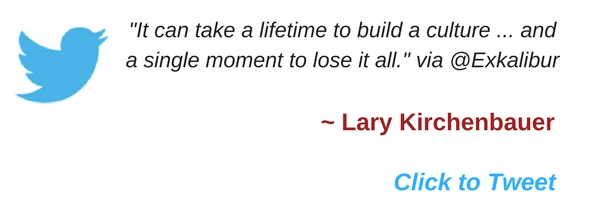W hat happened to all of the simple lessons your parents taught you?
You Don’t Want to be This Week’s Whipping Boy
Today’s whipping boy is Uber, but if you’re not paying close attention, your turn could be just around the corner.
In just the last few years, several surveys have identified culture and engagement as the #1 challenge around the world, with this startling statistic:
“… only 12 percent (of the survey respondents) believe their organizations are excellent at effectively driving the desired culture.”
[pullquote]The tendency to aggression is an innate, independent, instinctual disposition in man… it constitutes the powerful obstacle to culture. ~ Sigmund Freud[/pullquote]
What Happened To All Of The Simple Lessons Your Parents Taught You?
You probably experienced several similar events as these:
“You grabbed the last piece of cake before your sister could get it?”
“The principal called and said you broke another girl’s toy because she got to it first?”
“You pushed a boy on the playground because that boy got the last place on the teeter-totter?”
As I recall, these were followed closely by something like this:
“You know better than that!”
“You Know Better Than That!”
What made them think that we knew better than that?
It probably wasn’t written down anywhere since at that age, we couldn’t read much more than “Jack and Jill went up the hill”.
Our parents weren’t present at any of these events, and probably never identified these specific incidents …
- Who should get the last piece of chocolate cake?
- What does taking turns mean when the same kid always hogs the same toy?
- What to do when someone cuts in line ahead of us?
But It’s Not Fair!
How many times did we hear “you know better than that?” while we vehemently denied any misdeed even though we kinda knew what “know better” meant?
We usually responded with something like,
“That’s not fair.”
(Of course, we learned much later that “fair” is truly a 4-letter F-word)
We Were Taught A Code Of Moral Conduct
[pullquote]People have come to me over the years and said to me: ‘I admire the culture of Starbucks. Can you come give a speech and help us turn our culture around?’ I wish it were that easy. Turning a culture around is very difficult to do because it’s based on a series of many, many decisions, and the organization is framed by those decisions. ~ Howard Schultz, Founder & CEO[/pullquote]
Through word and deed, our parents nourished us with a code of moral conduct formulated with a recipe of standard ingredients.
- Respect for others.
- Sharing.
- Taking turns.
- Using our words not our fists.
- Looking out for those less fortunate.
- Even turning the other cheek.
Is your culture starting to look like a petri dish?
Some pretty strong words — “toxic and destructive” — have shown up as people have tried to explain Uber’s culture.
Outsiders may never know where the truth lies, but the controversy highlights some fundamental cultural differences between making money and serving clients.
It’s Easy When the Decisions are Convenient
When the decisions are convenient, it’s easy to say we do both.
We serve our clients to the best of our ability and it makes us money.
What could be better than that?
What About When Times Are A Little Tougher?
- What happens when times are a little leaner?
- When making money is an awful lot harder?
- Do we still serve our clients’ best interests … or do we tend to compromise on what serves them best?
- Are we focused on getting them to buy our product or service simply because we need the money regardless of how it meets their needs?
It’s Tempting To Gamble With Client Relationships
Yes, it would be easier if we could masterfully combine these concepts and neatly arrange them on a silver platter.
We know it’s possible to make money while serving our clients.
It’s just that when there are conflicting choices in front of us, it’s tempting to gamble with client relationships to meet our short-term objectives.
Don’t do it. No Exceptions.
[pullquote]We believe that it’s really important to come up with core values that you can commit to. And by commit, we mean that you’re willing to hire and fire based on them. If you’re willing to do that, then you’re well on your way to building a company culture that is in line with the brand you want to build. ~ Tony Hsieh, CEO, Zappos[/pullquote]
On any given day, these decisions are difficult, but reasonable leaders can disagree about what serves the best interests of the client.
You can be sure, however, that if you want to build a thriving business, with a sustainable value proposition, you need to focus intensely on meeting the best interests of your customers every single day.
No exceptions.
Don’t Line Your Pockets.
Line your customer’s pockets.
At certain times, the compromises may not seem worth it.
But your business will be at great risk when your customers learn – and you can be sure they will – that you are too eager to sell them products they don’t need and services they don’t want in the interest of lining your pocketbook instead of theirs.
A Lifetime to Build Trust. A Moment to Lose It.
As we know, it can take a lifetime to build trust … and a single moment to lose it all.
Leadership is about doing the right thing … not just anything.
Don’t let the trusted relationships with your clients become the first casualty of expediency or short-term objectives.
Just ask Mom and Dad.
They knew it all along.
Question: What’s the single thing you would change to improve your company culture?
Hop on over to our Facebook Page to leave your comment or question. I visit it every day and look forward to hearing from you and expanding our discussion of these ideas and concepts.



